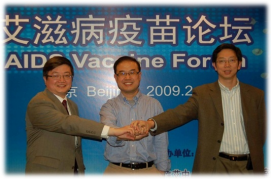Media
HKU and scientists in mainland China report new discovery of
AIDS mucosal vaccine
28 Mar 2013
Vaccine remains the ultimate solution to control the ongoing AIDS pandemic, which has led to 25 million deaths and 33 million people living with the AIDS virus, HIV worldwide. A collaborative team co-led by the AIDS Institute of the University of Hong Kong Li Ka Shing Faculty of Medicine, the Guangzhou Institute of Biomedicine and Health of Chinese Academy of Sciences and the Comprehensive AIDS Research Center of Tsinghua University has conducted a preclinical study of a novel AIDS mucosal vaccine strategy. The team discovers that the new strategy elicits high levels of HIV-specific T-cell and B-cell immunity in a monkey model system, which suppressed viral transmission and replication significantly, and delayed AIDS onsets in all rhesus monkeys vaccinated by the new strategy after pathogenic viral challenge. The research article has recently been published online in the prestigious virology journal, Journal of Virology.
Dr Chen Zhiwei, Director of the AIDS Institute of the University of Hong Kong Li Ka Shing Faculty of Medicine says, “The lack of an effective AIDS vaccine after over 30 years of efforts signifies the need of innovative ideas for discovery. Despite being major routes for HIV sexual transmission, mucosal surfaces are not targeted by most AIDS vaccines in clinical studies. To date, few AIDS mucosal vaccines have been invented in the world. The Chinese government has therefore launched the National Science and Technology Major Project “Development of Novel Mucosal Vaccines against HIV-1 Infection” during the 11th five-year plan. With supports of this project and Hong Kong Research Grant Council, the team of tri-institutional AIDS researchers aims to investigate an innovative idea of mucosal vaccination.”
Research method and result
During the five-year study, the team divides Chinese Rhesus monkeys into three experimental and two control groups. The novel vaccination strategy is conducted by an oral and intranasal prime with a replicating vaccinia Tiantan MVTT and followed by an intramuscular boost with a non-replicating Ad5. After vaccination, the researchers evaluate vaccine-elicited B and T cell immune responses. About twenty weeks after vaccination, all animals are challenged with a high dose of pathogenic monkey AIDS virus called SIVmac239 via the intrarectal route. The effectiveness of the vaccine is determined by measuring the amount of virus in the body, virologic and immunologic responses as well as the disease progression.
The result shows that the novel vaccination strategy is safe in all Chinese Rhesus monkeys. It elicits robust cellular immune responses with significantly enhanced magnitude, sustainability and poly-functionality, and higher titers of antibody responses in vaccinated monkeys as compared with control animals. The reductions in peak and set-point viral loads are significant in most animals, with one other animal being fully protected from a high dose intrarectal inoculation of SIVmac239. All monkeys vaccinated with the new strategy are clinical healthy. To the contrary, 75% of control animals develop and die of simian AIDS. The protective effects correlated with the vaccine-induced immunity. This study hence provides a novel strategy to develop HIV vaccine by using the combination of replicating vaccinia vector and mucosal priming.
Research implications
The study brings insight to AIDS vaccine’s strategy. Dr CHEN Zhiwei emphasises, “The major mode of HIV transmission among general populations in China including Hong Kong is unprotected sexual contact. Our vaccine design aims to protect HIV rectal transmission, a situation commonly found among men who have sex with men (MSM) population. HIV infection among MSM has become one of the most aggressive risk factors, which also requires stronger vaccine efficacy to block viral transmission as compared with unprotected heterosexual contacts.” He adds that although antiviral therapy saves and extends life for AIDS patients, issues of drug resistance and toxicity often lead to treatment failures and deaths. Also, the life-long antiviral treatment is not affordable among heavily affected populations especially in developing countries including China. China has the largest human population in the world. Using an effective mucosal vaccine to reduce HIV sexual transmission and viral replication in vivo would have significant implications for preventing a larger epidemic in China or a growing pandemic in the world.
Research Team
Dr Chen Zhiwei of the AIDS Institute of The University of Hong Kong Li Ka Shing Faculty of Medicine, Dr Chen Ling of the Guangzhou Institute of Biomedicine and Health of Chinese Academy of Sciences and Dr Zhang Linqi of the Comprehensive AIDS Research Center of Tsinghua University collaborate this study. The team of tri-institutional AIDS researchers has recently received continuous support from the National Science and Technology Major Project during the 12th five-year plan. The team aims to have the new vaccine strategy tested in clinical trials.
Media enquiries
For media enquiries, please contact Miss Vicky Chau of HKU Li Ka Shing Faculty of Medicine.
Please visit the website at http://www.med.hku.hk/v1/news-and-events/press-releases/ for press photos.
Dr Chen Zhiwei, (Left) Director of the AIDS Institute of the University of Hong Kong Li Ka Shing Faculty of Medicine, Dr. Zhang Linqi (middle) of the Comprehensive AIDS Research Center of Tsinghua University and Dr Chen Ling (right) of the Guangzhou Institute of Biomedicine and Health of Chinese Academy of Sciences initiated the tri-institutional collaboration.
Dr Chen Zhiwei, Director of the AIDS Institute of the University of Hong Kong Li Ka Shing Faculty of Medicine says, the Chinese government has launched the National Science and Technology Major Project “Development of Novel Mucosal Vaccines against HIV-1 Infection” during the 11th five-year plan. With supports by this project and Hong Kong Research Grant Council, the team of tri-institutional AIDS researchers aims to investigate an innovative idea of mucosal vaccination.


